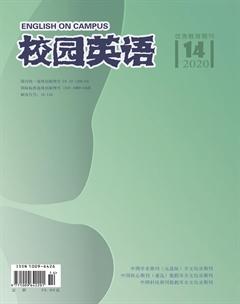Untranslatable Cultural Experiences in Metaphor
【Abstract】Every rhetorical device has its function. Using rhetorical devices in literature is more conductive to the expression and communication of the authors emotions. In general, most rhetorical devices can be translated, but some situations cannot be translated. Take one poem of Wang Wei as an example to discuss untranslatable cultural experiences in metaphor.
【Key words】untranslatable; cultural experiences; metaphor
【作者简介】梁美玲,广州涉外经济职业技术学院。
1. Introduction
Rhetorical devices are very important in literature. If ‘translating means ‘translating meaning, then clearly one must take into consideration these important figures.[ Nida, Eugene A. Translating Meaning. English Language Institute, 1982. 10. Print.] Metaphor is one of rhetorical devices, and the metaphor as same as other rhetoric has its function. To translate metaphor, not only should consider its function, but also need to achieve the same feelings in the source text and target text. This paper will discuss untranslatable cultural experiences in metaphor.
2. Metaphor
The essence of metaphor is understanding and experiencing one kind of thing in terms of another.
The translation of metaphor needs to consider many factors, such asthe sentence structure, and the abstract emotions and feelings, and different cultural experiences. To translate source text, many translators firstly will consider the sentence structure and the literal meaning. Secondly, they will consider the abstract emotions and feelings in metaphor. Even they are aware of the the abstract emotions and feelings, they still hard to handle the translation of metaphors because of the different cultural experiences in Chinese and English.
3. Different cultural experiences in Chinese and English
Different cultural experiences will let Chinese and English people have the different feelings, such as “dragon”, “dog”,“moon”, “flower” and some on. This paper will focus on the different cultural experiences and discuss whether metaphors can be translated. Taking one poem of Wang Wei as an example, and analyze the translation of Xu Yuanchong.
紅豆生南国, The red beans grow in southern land.
春来发几枝?How many load in spring the trees?
愿君多采撷,Gather them till full is your hand;
此物最相思。They would revive fond memories.
In this poem, red beans(红豆)are one kind of thing in terms of another. In ancient China, a woman was very sad because her husband died in the war. She cried every day under the tree and missed her husband very much. In the end, she died under the tree and became a red bean. People usually use red beans to express lovesickness.
However, “红豆” does not have the same meaning in western cultures. Translating “红豆” as “red beans” will confuse the western readers and it cannot achieve the effect in the original text. What determines the translatability of a source language metaphor is not its ‘boldness or ‘originality , but rather the extent to which the cultural experience and semantic associations on which it draws are shared by speakers of the particular target language. “红豆” does not have the same cultural experience for Chinese people and English people, so it does not have the semantic relevance either.
4. Untranslatability in different cultural experiences
If translator translated “红豆” as “red beans”, the metaphor cannot be presented in the translation. Mary Snell-Hornby also pointed out that whether metaphor should be translated must depend on the structure and function of the particular metaphor within the text concerned. Red beans do not have the meaning of love and lovesickness in western cultures, so this translation loses the function of the particular metaphor within the text concerned.
From my point of view, the function of metaphor includes two points. To let target readers understand the text easily is the first function. The second is to achieve the same experience of source language. If translators want to achieve the translation of metaphor, they should replace red beans with other word choices, but the word choices must have the implied meaning to express lovesickness. Innes Herdan tried to use “forget-me-not” instead of “red beans”. “Forget-me-not” is a plant that can express lovesickness in western culture. So, Innes Herdan translated the last sentence “此物最相思” as “These are the best forget-me-nots[ Herdan, Innes, and Yee Chiang. 300 Tang Poems. Yuan Dong Tu Shu Gong Si, 2000.Print.]!” This sentence looks very strange in the context. Forget-me-nots grow in America actually, not southern land. Also, this sentence cannot be translated because it lacks a common cultural experience.
5. Conclusion
Therefore, the translatability of metaphor should satisfy three conditions: common cultural experiences, semantic associations, and function with text concerned. If the translation cannot meet these three conditions, the metaphor will be untranslatable. A common cultural experience is the most important factor among these three conditions. A common cultural experience is the premise of translation metaphor. Only Chinese and English people have the same feeling in one thing, and then they can understand semantic association. Only these two factors are realized, the function of metaphor can be achieved.
References:
[1]Nida, Eugene A. Translating Meaning[J]. English Language Institute,1982,10. Print.
[2]Lakoff, George, and Mark Johnson[M]. Metaphors We Live By. University Of Chicago Press,2006.Print.
[3]陳铁民.王维,孟浩然诗选[M].中华书局,2005,93.Print.
[4]Xu, Yuanchong, and Min An. Xu Yuan Chong Ying Yi Wang Wei Shi Xuan[J]. Zhongguo Dui Wai Fan Yi Chu Ban You Xian Gong Si, 2014.Print.
[5]Dagut,M.B.Can‘MetaphorBe Translated?[J]. Babel.Vol.33, No.2,1987:77-83.
[6]Snell-Hornby, Mary. Translation Studies[M]. Shanghai Waiyu Jiaoyu Chubanshe, 2001,58. Print.
[7]Herdan, Innes, and Yee Chiang. 300 Tang Poems[J]. Yuan Dong Tu Shu Gong Si, 2000. Print.

